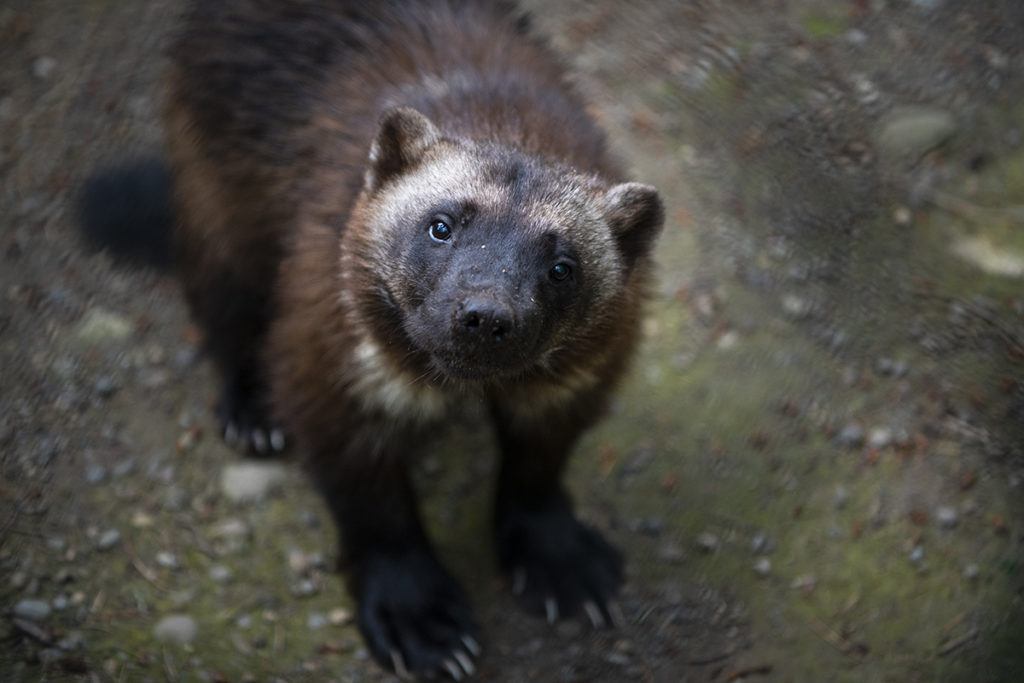9:30am
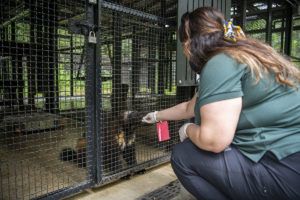
It’s pretty good when your work day starts with a furry fan club as excited as Rainier and Ahma.
Keeper Alex Cruz arrives for the “late” shift at Northwest Trek’s Forest+Wetlands habitat at 9:30am. After checking email and chatting with the keepers who’ve been on shift since 7:30am, she makes her way up to two wolverines who are very keen to see her.
“I’m their primary trainer right now, and usually the first person in to see them in the morning,” explains Cruz, setting two tubs of raw meat onto a barrel and picking up a pan and brush. “They’re so special to me.”
“Hi there!” she calls to Rainier, the brother of the sibling pair, who’s darting energetically around in the undercover area where he and sister Ahma spend each night. “Hey, Ahma, I see you.”
9:45am
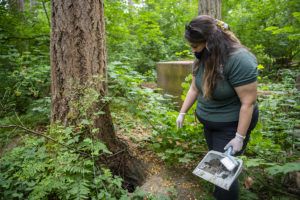
Cruz’s first task, though, is to head out into the still-empty habitat, forested with tall trees and lush ferny undergrowth, to scoop poop (an important way to monitor health) and check that everything’s safe. As she walks the perimeter she tests the fence, greets guests, notes a couple of dens Ahma has been burrowing and picks up fallen branches. She cleans and refills a big water dish.
Finally, it’s time for food, fun and work. Picking up a tub of meat, Cruz gets the attention of Rainier, who’s scampering around inside.
“Up!” she cues, gesturing with two gloved palms on the mesh, and Rainier leaps to match paws for a meatball reward.
“Open,” she says, fingers wide, and the wolverine spreads his tough-but-tiny jaws for another morsel.
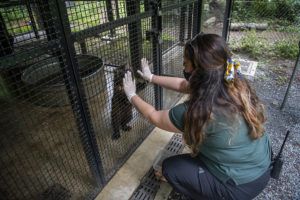
Then comes “Paw!” (sliding one paw under the mesh), “Climb!” (a swift, six-foot scaling of the mesh) and back to the beginning. Cruz and
Rainier work seamlessly, mirroring actions and touching hand-to-paw with complete trust.
Keepers work to train almost all the animals at Northwest Trek, not just to bond but to give mental and physical stimulation that enriches their lives and protects their health. And most behaviors are also designed to help animals participate in their own health care: sliding a paw under the mesh helps for nail trimming, skin examination and maybe eventually a blood sample for diagnosis, for instance.
“I gravitated immediately to the wolverines when I first arrived,” explains Cruz, who works with them at least once a day, sometimes from the guest viewing deck. “I really felt a connection with them, especially Rainier. People think they’re vicious, but they’re so cute and smart.
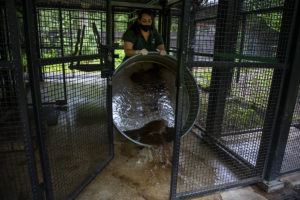
Actually, I did my job interview up here, and I just looked at him and thought, you’re it. And I’ve been the one to work on training him from the very beginning, which is really special.”
Then it’s Ahma’s turn, the smaller female responding eagerly then smuggling her treat away to nibble in private. Rainier, meanwhile, is rolling around on the floor.
“Males are usually more playful, and Rainier is so goofy,” Cruz says. “”Females are smaller but they’re the boss.”
After the training session, Cruz opens up the gates to the main habitat.
“Ok, out you go!” she says, although it’s clear that Rainier and Ahma are perfectly happy playing around with Cruz as the audience. She shakes her head and smiles.
10am
Next it’s time to care for some animals that Northwest Trek guests rarely see, unless they book a Virtual Field Trip. Cruz grabs a hose and heads into a big aviary, where a small kestrel flutters into a corner.
“Hi, nugget!” she says warmly, and begins cleaning, refilling water, picking up rabbit bones (thoroughly picked over) and visually checking the bird for good health.
Cruz sets the duck pool to start emptying, then checks in on the wolverines, who are having a great time on a platform swing built for them by a volunteer.
“Are you kidding?” she laughs. “Time to go out, buddy!”
10:15am
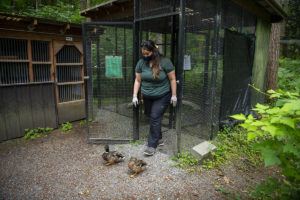
It’s duck time. Cruz feeds a second hose into the aviary where two mallard ducks are milling around the doorway. Mr. (the male) is much more vocal, with glossy emerald plumage, while Mrs. has a more sedate dappled brown.
“It’s breeding time, so he’s very protective of his lady,” explains Cruz, sidestepping Mr. as he determinedly pecks her toes.
Cleaning and refilling the ducks’ large pool is a daily chore.
“They do everything in the water: eat, swim, poop, shed feathers,” says Cruz dryly, picking up endless bits of white fluff. Then she fills up a spare tub with water.
“Want an extra pool today?” she asks the duck pair. “It’s like new furniture for them, extra enrichment.”
After a scattering of mealworms, lettuce and chopped carrots, she squirts extra water into the entryway and the ducks excitedly burrow into the gravelly puddle, hunting for bugs.
“This is their favorite thing,” smiles Cruz.
11am
Cruz heads back to the Wetlands kitchen office, where she’ll write up detailed notes on each animal’s health and training for the daily report. Then it’s over to otters and badgers for the midday feed.
1pm
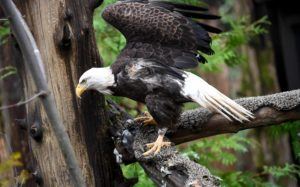
After her own lunch, Cruz will move on to feed, clean and care for the birds: bald eagles, golden eagles, snowy owls, barn owl. Cheveyo, a bald eagle who arrived at Northwest Trek with an amputated wing, needs extra attention with feeding – Cruz gently places a dead mouse or rabbit on her favorite perching branch and steps back, watching to make sure it’s within easy reach and that the other eagles aren’t tempted to take it.
6pm
At the end of the day, she’ll help close up the habitats for wolverines, cougar and bears, making sure everyone’s okay and inside. As a newer zookeeper (Cruz is 29, with a Bachelor of Science degree and five years of prior zoo experience) she’ll also work weekends and holidays, taking Tuesday-Wednesday as her “weekend”.
At home she has two cats, but loves hiking and visiting other zoos when she can.
“I love this job,” she says. “I chose to be a zookeeper to protect animals that don’t have a voice. And there are so many things that make it so worth it to come each day. But the best thing is seeing your animals recognize you. All the keepers wear green shirts, so we all look the same. So when you call them by name and they come over, because you’ve built the relationship, that’s the best thing ever.”
